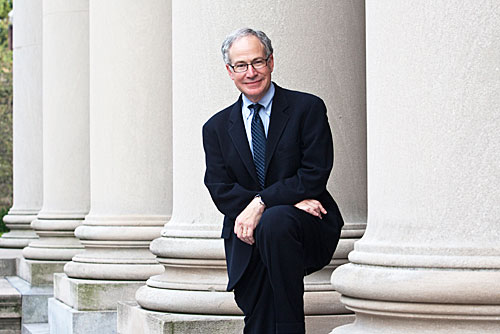
“It is gratifying to have the excellence of Harvard’s doctoral programs recognized by the National Research Council,” Harvard President Drew Faust said. “The fact that we have so many top-rated programs means that every student and faculty member, regardless of School or department, is able to benefit from the collective strength of the University, making the whole genuinely greater than the sum of the parts.”
Kris Snibbe/Harvard Staff Photographer
High marks for doctoral programs
Study rates Harvard Schools highly across many fields
Harvard University’s doctoral programs received exceptionally high evaluations in the National Research Council’s Assessment of Research Doctoral Programs, which was released on Tuesday (Sept. 28).
The long-anticipated report, a significant study of doctoral education across the nation, rated nearly 5,000 programs at 212 institutions on the basis of quantitative and faculty-assessed data concerning research productivity, student outcomes, and diversity of environment, among other variables.
Programs were given two overall ranking ranges to reflect the complexity of the data. Of the 52 Harvard programs in the survey, 27 placed as high as first in at least one of the overall rankings. Ninety percent of the University’s programs placed as high as fifth in at least one of the overall rankings.

“It is gratifying to have the excellence of Harvard’s doctoral programs recognized by the National Research Council (NRC),” Harvard President Drew Faust said. “The fact that we have so many top-rated programs means that every student and faculty member, regardless of School or department, is able to benefit from the collective strength of the University, making the whole genuinely greater than the sum of the parts. These results are a tribute to the quality of the students, faculty, and staff at work across every part of this University.”
“This report shows that in the dominant, core disciplines that are crucial to the overall strength of any institution of higher learning, our Ph.D. programs are remarkably strong, vibrant, and successful,” said Dean Allan M. Brandt of the Graduate School of Arts and Sciences (GSAS). But “it’s the collective excellence that is most striking,” Brandt said, since Harvard’s highest-rated programs come from across disciplines.
Dean Michael D. Smith of Harvard’s Faculty of Arts and Sciences (FAS) said the results “provide much-deserved recognition to our outstanding faculty and students. But even more important, it tells us that now and in the coming decades, as we engage in more teaching and research across departmental and disciplinary lines, we are building those interdisciplinary programs on the best possible foundation — programs that are among the best in their individual fields.”
“The overall strength of our doctoral programs also benefits our undergraduates, who work intensively with graduate students as part of their educational experience,” Smith noted.
“We are delighted and proud that each of our four Division of Medical Sciences programs ranks at the very top of the National Research Council list,” said Jeffrey S. Flier, dean of the Harvard Faculty of Medicine. “Such results no doubt validate the unparalleled work of our faculty in their efforts to train future leaders in biomedicine.”
The survey is conducted about every 10 years, and is designed to help universities assess their programs. The reports provide useful information to prospective students, government agencies, foundations, and the public.
“With our recent transition from a division to a School, we are extremely encouraged that the NRC rankings reflect the growing dynamism of our multidisciplinary graduate programs,” said Dean Cherry A. Murray of Harvard’s School of Engineering and Applied Sciences. “Moreover, given the stunning intellectual strength and breadth of Harvard, our engineers and applied scientists are smack dab in the middle of one of the most amazing places in the academic universe.”
“We are gratified by the results, as they support our belief that HSPH is a great school of public health within a great University,” said Dean Julio Frenk of the Harvard School of Public Health.
For more information on the report.



